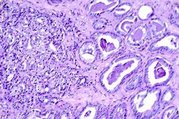|
|
Prostate Cancer Hormone Therapy May Raise Mortality
By Megan Rauscher, Yahoo News
September 23, 2008

Prostate cancer cells are seen in a handout photo from the National Cancer Institute. REUTERS/Handout
In elderly men with early-stage prostate cancer, receiving hormone therapy is associated with an increase in all-cause mortality, according to a study reported Tuesday at the American Society for Therapeutic Radiology and Oncology's 50th Annual Meeting underway in Boston.
"Our study shows that for men over 70 with early-stage prostate cancer, androgen deprivation therapy as a form of treatment may do more harm than good," said Dr. Amy M. Dosoretz, a radiation oncology resident at the Harvard Radiation Oncology Program in Boston, who led the study.
The findings of this study are "potentially practice-changing," said Dr. Louis Harrison of Beth Israel Medical Center, New York, and moderator of a press briefing where the findings were released.
Dosoretz and colleagues reviewed the records of more than 1700 men, at least 70 years of age, with early-stage prostate cancer, who were treated with a short course of hormone therapy -- about 3.5 months -- before undergoing brachytherapy. Hormone therapy decreases levels of androgen, a hormone that stimulates the growth of prostate cancer cells.
Brachytherapy is a procedure in which radiation "seeds" are strategically implanted in the prostate tumor that continuously release small doses of radiation to destroy the cancer cells.
Some of the patients received brachytherapy alone. None of the men underwent conventional external-beam radiation therapy.
After an average follow-up of 5.0 years, the men who received hormone therapy were 20 percent more likely to die from any cause compared with the men who received brachytherapy alone, Dosoretz reported. The findings were unchanged after the researchers adjusted the data to include the patient's age and factors known to influence the prognosis of prostate cancer.
It's currently unclear why hormone therapy before radiation seed implantation would increase the risk of death in older men with early-stage prostate cancer, Dosoretz said. However, the presence of other illnesses could raise the risk of treatment-related complications, including cardiovascular complications, she suggested.
"Our message is that in older patients it is very important to weigh the risks and benefits of hormone therapy when designing a treatment plan," Dosoretz told conference participants.
More Information on US Health Issues
|
|



